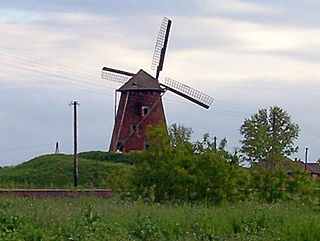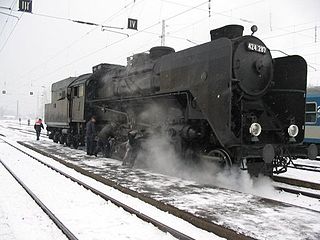
Pest is a county (vármegye) in central Hungary. It covers an area of 6,393.14 square kilometres (2,468.41 sq mi), and has a population of 1,339,090 (2023). It surrounds the national capital Budapest and the majority of the county's population live in the suburbs of Budapest. It shares borders with Slovakia and the Hungarian counties Nógrád, Heves, Jász-Nagykun-Szolnok, Bács-Kiskun, Fejér, and Komárom-Esztergom. The River Danube flows through the county. The capital of Pest County is Budapest, although Budapest is not part of Pest County. Starting 2018, they also constitute different NUTS:HU level 2 regions, as previously Pest County has lost catch-up aids from the European Union because of the high development of Budapest.

Nyíregyháza is a city with county rights in northeastern Hungary and the county capital of Szabolcs-Szatmár-Bereg. With a population of 118,001, it is the seventh-largest city in Hungary and the second largest in the Northern Great Plain region. Its development has been ongoing since the 18th century, making it the economic and cultural center of the region. Nyíregyháza Zoo, with over 500 species, is recognized throughout Europe.

Csongrád-Csanád is an administrative county in southern Hungary, straddling the river Tisza, on the border with Serbia and Romania. It shares borders with the Hungarian counties Bács-Kiskun County, Jász-Nagykun-Szolnok County and Békés. The administrative centre of Csongrád-Csanád county is Szeged. The county is also part of the Danube–Criș–Mureș–Tisa Euroregion.

Szolnok is the county seat of Jász-Nagykun-Szolnok county in central Hungary. A city with county rights, it is located on the banks of the Tisza river, in the heart of the Great Hungarian Plain, which has made it an important cultural and economic crossroads for centuries. Szolnok also has one of Hungary’s best water polo teams.
The Hungarian State Railways is the Hungarian national railway company and the MÁV Pályaműködtetési Zrt. is the railway infrastructure manager, with subsidiaries "MÁV Személyszállítási Zrt.", and "Utasellátó".

Mezőtúr is a town in Jász-Nagykun-Szolnok county in Hungary, located southeast from Budapest and 88 miles away by rail. It possesses important potteries. Large herds of cattle are reared on the communal lands, which are productive also of wheat, rapeseed and maize. Several well-attended fairs are held here annually.

Budapest Keleti station is the main international and inter-city railway terminal in Budapest, Hungary.

Jász–Nagykun–Szolnok is an administrative county in Hungary. It lies in central Hungary and shares borders with the Hungarian counties Pest, Heves, Borsod–Abaúj–Zemplén, Hajdú–Bihar, Békés, Csongrád, and Bács–Kiskun. The rivers Tisza and Körös flow through the county. The capital of Jász–Nagykun–Szolnok county is Szolnok. Its area is 5582 km2. The county is named after the Ossetians (Jasz) and Cumans (Kun) who settled there, along with Szolnok. The county was part of the Danube–Criș–Mureș–Tisa Euroregion between 1997 and 2004.

Mezőberény is a town in Békés county, Hungary.

The MÁV class 424 is a famous class of Hungarian steam locomotives. The class appears in numerous nostalgic remembrances, in literature, in the movies and as models. The 424 class is a double-chimneyed, superheated machine. Its nicknames were "Buffalo" and "Nurmi".
Tiszatenyő is a village in Jász-Nagykun-Szolnok county, in the Northern Great Plain region of central Hungary.
Farmos is a village in the district of Nagykáta, in the middle of Pest county, and in the agglomeration of Budapest in Hungary. Farmos can be reached via Secondary Main Road 311 from Nagykáta, Tápiószele and Secondary Main Road 31 from Jászberény. The village has a railway station, which is connected to the Budapest-Nagykáta-Szolnok railway line.
Tápiószentmárton is a village in Pest county, Hungary.

The Monorierdő train collision occurred on 6 October 2008, near Monorierdő, Hungary. A regular passenger train coming from Cegléd collided with the Hajdú InterCity train, on its way from Nyíregyháza to Budapest. At 10:20 CEST, the regular train's control car crashed into the last car of the Intercity train; its engine driver survived, because he ran back into the first car to warn the passengers when he realized the accident could not be avoided. The tragedy was caused by an error in the train control system and by the error of the passenger train's driver.

Kelenföld railway station is among Budapest's four busiest railway stations. Opened in 1861, it is situated south-west of the city centre, in Újbuda or District XI in the suburb Kelenföld.

Budapest–Újszász–Szolnok railway line is the number 120a line of the MÁV. It is a double track, electrified track, which is part of the international rail system. It goes on as Line number 120, which connects Budapest, Békéscsaba, Lökösháza, Arad. The line from Budapest to Szolnok is 100 km long.

The railway line from Budapest to Záhony via Szolnok, Debrecen and Nyíregyháza is Hungarian State Railways line 100. It is 335 kilometres (208 mi) in length and is a double-track main line with 25 kV/50 Hz electrification. The northern section, from Nyíregyháza to Záhony, is designated 100b.

Szolnok railway station is a railway station of the Hungarian State Railways (MÁV) in Szolnok, Hungary. Szolnok is a major railway junction, with lines branching out in all four cardinal directions.

Nagykáta is a district in eastern part of Pest County. Nagykáta is also the name of the town where the district seat is found. The district is located in the Central Hungary Statistical Region.

Suburban trains in Budapest are known in Hungarian as Budapesti elővárosi vonatok, serving fourteen lines in the Budapest metropolitan area, three of which are part of the BHÉV system. The system is operated by Hungarian State Railways.

















